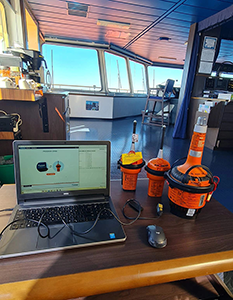GMDSS & AIS Survey
Radio survey is a set of testing services provided for a vessel to verify and confirm its readiness and safety for navigation in appropriate sea area. The condition of the ship and its equipment shall be maintained to conform with the provisions of the SOLAS regulations to ensure that the ship in all respects will remain fit to proceed to sea without danger to the ship or persons on board.
Titanic disaster in 1912.
History.
After Titanic disaster in 1912, the world's community understood the necessity to bring maritime safety rules on international level. IMCO (Inter-Governmental Maritime Consultative Organization) gathered and elaborated the first International Safety of Life at Sea (SOLAS) Convention in 1914. This convention had not luck to be applied because of the World War I. In consequence, the SOLAS Convention was recast and updated in 1960 and 1974. Present days the consolidated redaction of 1974 with continuous amendments is in use.
Radio Surveys should be carried out in accordance with SOLAS Convention, reference is made to the "IMO Resolution A.1156 (32) - SURVEY GUIDELINES UNDER THE HARMONIZED SYSTEM OF SURVEY AND CERTIFICATION (HSSC), 2021".
SOLAS Regulations.
The SOLAS regulations concerning radio communications, unless expressly provided otherwise, do not apply to:.
- Ships of war and troopships.
- Cargo ships of less than 300 gross tonnage.
- Ships not propelled by mechanical means.
- Wooden ships of primitive build
It is stated that initial and annual radio survey, issuance, renewal and endorsement of Safety Radio Survey Certificates of radio installations on SOLAS ships should be carried out in accordance with the rules laid down in IMO resolution A.1156 (32). The radio survey should always be performed by a fully qualified radio surveyor who has adequate knowledge of the IMO`s relevant Convention, particularly SOLAS and associated performance standards, and appropriate ITU Radio Regulations. The radio survey should be carried out using suitable test equipment capable of performing all relevant measurements required by these Guidelines. It is considered as very important that the responsible radio operator (holding a GOC or ROC certificate) is properly instructed and trained in how to use the GMDSS radio equipment.
Inspection Checklist.
During the survey, our engineer check and test as necessary the following items:
- Source of energy
- Radio installations
- Antennas
- VHF transceivers
- VHF DSC controller and Channel 70 DSC watch receiver
- MF radiotelephone equipment, or MF/HF radiotelephone equipment
- MF/HF radio telex equipment
- MF DSC controller(s), or MF/HF DSC controller(s)
- MF DSC watch receiver(s), or MF/HF DSC watch receiver (s)
- INMARSAT Ship Earth Station(s)
- NAVTEX equipment
- Enhanced Group Call
- Float free satellite EPIRB
- Two-way VHF radiotelephone apparatus for survival craft
- Radar transponders (Now called "search and rescue locating devices" and may include AIS-SARTs)
- Test equipment and spares carried
- Radar(s)
- ARPA
- Receiver for a Global Navigation Satellite system or a Terrestrial Radionavigation System (GPS)
- Automatic Identification System (AIS)
- Electronic Chart Display and Information System (ECDIS)
Privacy Preferences
When you visit our website, it may store information through your browser from specific services, usually in the form of cookies. Here you can change your Privacy preferences. It is worth noting that blocking some types of cookies may impact your experience on our website and the services we are able to offer.




